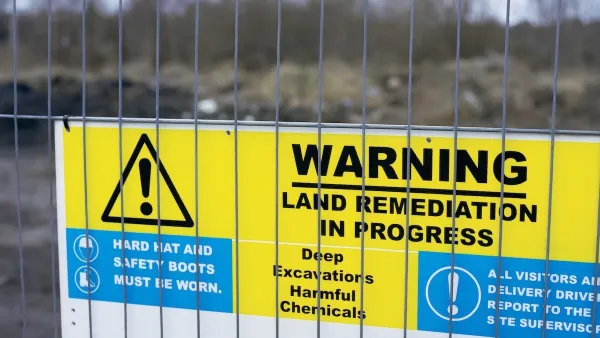The Biden administration's climate plan calls for sweeping reform in the country's energy policy and places new focus on addressing racial and economic disparities.

President Biden's plan to address climate change will prioritize environmental justice, acknowledging the country's legacy of "persistent racial and economic disparities." Writing for the Washington Post, Juliet Eilperin, Brady Dennis, and Darryl Fears call Biden's plan an "unprecedented push to cut the nation’s greenhouse gas emissions and create new jobs as the United States shifts toward cleaner energy," reporting that the president has directed federal agencies to invest 40% of sustainability funding in communities that "have traditionally borne the brunt of pollution."
Centering environmental justice could start to reverse decades of government decisions that imperiled low-income communities and people of color, "Black, Latino and Native American communities targeted for hazards that others did not want: power plants, landfills, trash incinerators, shipping ports, uranium mines and factories."
"It’s hard," the president said, referring to communities that are just a fenceline away from polluting facilities. "The hard-hit areas like Cancer Alley in Louisiana, or the Route 9 Corridor in the state of Delaware. That’s why we’re going to work to make sure that they receive 40 percent of the benefits of key federal investments in clean energy, clean water and wastewater infrastructure."
An executive order signed by President Bien established the White House Interagency Council on Environmental Justice, a new office of health and climate equity at the Health and Human Services Department, and an environmental justice office within the Justice Department.
FULL STORY: Biden to place environmental justice at center of sweeping climate plan

Planetizen Federal Action Tracker
A weekly monitor of how Trump’s orders and actions are impacting planners and planning in America.

San Francisco's School District Spent $105M To Build Affordable Housing for Teachers — And That's Just the Beginning
SFUSD joins a growing list of school districts using their land holdings to address housing affordability challenges faced by their own employees.

The Tiny, Adorable $7,000 Car Turning Japan Onto EVs
The single seat Mibot charges from a regular plug as quickly as an iPad, and is about half the price of an average EV.

Seattle's Plan for Adopting Driverless Cars
Equity, safety, accessibility and affordability are front of mind as the city prepares for robotaxis and other autonomous vehicles.

As Trump Phases Out FEMA, Is It Time to Flee the Floodplains?
With less federal funding available for disaster relief efforts, the need to relocate at-risk communities is more urgent than ever.

With Protected Lanes, 460% More People Commute by Bike
For those needing more ammo, more data proving what we already knew is here.
Urban Design for Planners 1: Software Tools
This six-course series explores essential urban design concepts using open source software and equips planners with the tools they need to participate fully in the urban design process.
Planning for Universal Design
Learn the tools for implementing Universal Design in planning regulations.
Smith Gee Studio
City of Charlotte
City of Camden Redevelopment Agency
City of Astoria
Transportation Research & Education Center (TREC) at Portland State University
US High Speed Rail Association
City of Camden Redevelopment Agency
Municipality of Princeton (NJ)





























